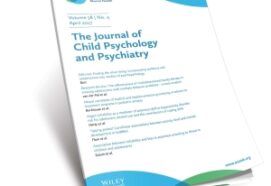Watch this video abstract from Rebecca Anthony on her CAMH 2023 Special Issue paper ‘Young people’s online communication and its association with mental well-being: results from the 2019 student health and well-being survey’.
Authors; Rebecca Anthony, Honor Young, Gillian Hewitt, Luke Sloan, Graham Moore, Simon Murphy, Steven Cook
First published: 16 November 2022
Open Access paper doi.org/10.1111/camh.12610

I am currently a research associate for DECIPHer (Centre for Development, Evaluation, Complexity and Implementation in Public Health Improvement) and the Wolfson Centre for Young People’s Mental Health, based at Cardiff University. My role involves conducting public health improvement research within the fields of child and adolescent development, mental health, social care and education. I support the development of peer-reviewed publications and government reports using data generated by the School Health Research Network (SHRN). My research interests are in the area of improving outcomes for children and young people, with a focus on those who have experienced care.
Transcript
Rebecca Anthony: Hi, my name is Rebecca Anthony. I’m a research associate for DECIPHer, the Center for the Development, Evaluation, Complexity, and Implementation in Public Health Improvement Research, and the Wilson Center for Young People’s mental. Health, both based at Cardiff University in Wales in the UK. Today I’m going to be talking about a paper called “Young people’s online communication and its association with mental well-being– results from the 2019 student health and well-being survey.” It was led by myself, alongside colleagues from Cardiff University and the University of Michigan and was recently published in Child and Adolescent Mental Health. PARAGRAPH: So briefly, today I’m going to be talking to you about the background to the study and the methods that we use, the key findings, and some of the conclusions. So interpersonal communication is one of the most common activities for young people to engage with online.
Most young people have a social media profile and use the internet to communicate often. And most research so far has examined the association between the time spent online and depression, anxiety, mental well-being symptoms. However, kind of lumping together all social media in this way doesn’t allow to look at some of the nuances in terms of what they’re doing and who they’re engaging with.
So there’s huge variations to what people are doing online. Going on TikTok and watching YouTube videos isn’t the same as direct messaging a friend or kind of playing video games with friends you’ve seen at school that day. And this homogeneous view of social media doesn’t allow for aspects such as who the young people are engaged with. And that’s something that we were really interested in this study.
So for this study, we used data from the Student Health and Wellbeing Survey, which is a biannual survey administered to 11 to 16-year-olds secondary school pupils in Wales. And it was developed from the World Health Organization’s Health Behaviour in School-age Children, or the HBSC, survey. And it aims to monitor adolescent health behaviours in Wales to increase our understanding and inform policy.
It covers a huge amount of themes such as mental health and well-being, school life, physical activity and diet, family and social relationships, family and social life, relationships, substance use, and gambling. And so 2019, over 119,000 students from 198 schools across Wales completed the survey. So it’s a fantastic resource and provides a nationally representative sample of adolescents in Wales.
So what do we do with the survey? So we looked at responses from over 38,000 children and young people. So a subsample of the main survey who were asked about their kind of online communication behaviours. So we examined the association between online communication and mental well-being. We used multivariate models to assess the relationship between who adolescents were communicating with online and their mental well-being.
And within these regression models, we controlled for confounders, such as passive social media use, i.e. using social media to escape from negative feelings, friendship quality, how they perceive their friendship, their relationships with friends, and cyberbullying. So some of our key findings. We found that students are highly engaged on social networking sites.
Many were using these sites daily. And we found frequent online communication with their best friends. And their wider friendship groups were associated with higher levels of well-being. However, the frequency of online contact with virtual friends, i.e. friends they haven’t met in real life but have only made online, was associated with poorer well-being.
And it had a much larger negative association for girls than boys. So this was a really important message. So some conclusions from our study. The research investigating time spent online only may be over simplistic and fail to consider some of the specific nuances such as what they’re doing and who they are engaging with. Our study found that the association between online communication and well-being vary depending on who adolescents were engaging with.
Rather than overemphasizing the significance of time spent online and uniformly casting online communication as something that needs to be heavily monitored and controlled, education for young people and their parents should acknowledge the possible benefits of online communication with existing friendship groups while limiting harms. And we felt that interventions to improve young people’s well-being should consider those positive associations.
So thank you for listening today to this brief summary of our paper. And you can find out more here. I’ve put the links to the paper and my email address, if you have any questions, and the DECIPHer and Student Health Research Network websites. Thank you very much for your time.
Speaker: Find out more about becoming an ACAMH member. And to be part of the Advancement of Child and Adolescent Mental Health, visit www.acamh.org.


